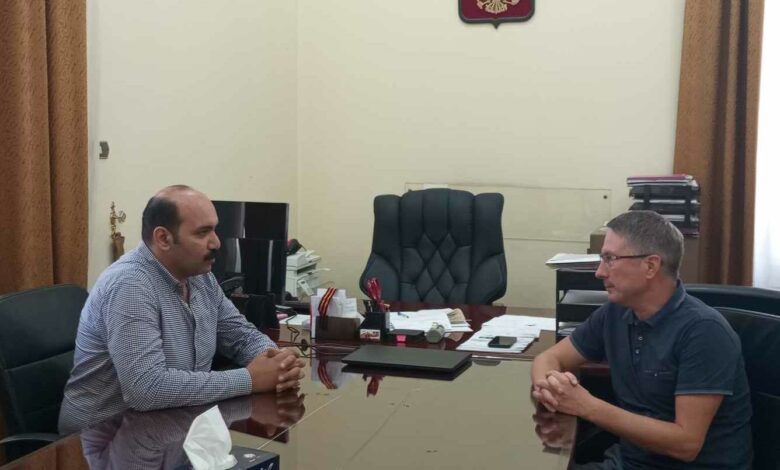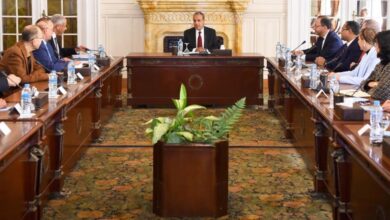
The Director of the Russian Cultural Center in Egypt, Murat Gatin, said that Egypt’s membership in the BRICS group is crucial as it is the gateway to Africa, and one of the most important countries in the Arab world.
In this exclusive interview, he added that Foreign Minister Badr Abdel Ati met with a number of officials, including the Minister Russian Foreign Minister Sergei Lavrov, regarding the Cultural Center.
There are approximately 1,400 students there studying the Russian language annually, he said, while stressing at the same time the organization of events specifically for the art of ballet in the opera.
He added that there are 8,000 mosques in his country for about 20 million Muslims.
What are the center’s most prominent new cultural activities?
Next week, the Russian Cultural Center in Cairo will host the “Good Deeds” Forum for People with Special Needs, during which a meeting will be organized between Russian and Egyptian experts and non-governmental institutions to exchange ideas and experiences.
It will continue from September 24-25, and with the conclusion of the events, a visit will take place to the Dabaa Nuclear Station.
The aim of the forum is cultural and social rehabilitation programs in order to integrate them into society.
In October there will be performances by the “St. Petersburg” ballet troupes, in the Cairo and Alexandria Opera, and there will be Russian artists, who will display their artwork about the culture and civilization of Egypt from October 6-12.
There is a clear interest in teaching the Russian language. How many students are there?
Egyptian youth are interested in studying the Russian language, and evidence of this is the opening of new departments in various Egyptian universities, as well as King Salman University in Sharm El Sheikh and the Egyptian Chinese University.
Annually, more than 1,400 students study at the center, and there is a youth club in the Russian House where they meet daily and practice the language to master it, in addition to interacting in various activities and playing chess.
Music, theatrical art, and the Russian House are frequented by 500 people with interests in language, culture, literature, drawing, gymnastics, alongside studios for playing piano, guitar, singing, ballet, and learning computer programs.
Did language education contribute to creating job opportunities for these young people?
Yes, many young people visit the center, whether for study or daily interaction.
A lot of them have obtained job opportunities in the Dabaa nuclear station project.
The Youth Club also contributed to raising the level of the language in all specializations required for work, and in the Russian industrial zone specifically in Ain Sokhna and Port Said.
The presence of more than 35 Russian companies in Egypt has contributed to attracting investments and providing job opportunities for young people to work.
Therefore, I can say that the Russian House has become a place for training and helping students to work in various fields, as well as tourism activity.
Up to 1.8 million tourists visit Egypt annually, and the Russian community in Egypt has about 35,000 residents, including 19,000 in Hurghada, and six thousand In Sharm El Sheikh, Cairo alongside in Alexandria, Gharbia, Port Said and Upper Egypt.
So, how do you see relations between Egypt and Russia in light of the bilateral visits, the latest of which is the visit of Foreign Minister Badr Abdel-Aty to Moscow on Monday?
Indeed, the visit of Foreign Minister Badr Abdel Ati and his meeting with a number of officials, including Russian Foreign Minister Sergei Lavrov, confirms that relations with Egypt are one based on friendship, which we are always strengthening and consolidating.
During the last 10 years there has been tremendous development compared to what they were before, and there is a strong consensus and understanding between Abdel Fattah al-Sisi and his Russian counterpart, Vladimir Putin.
This in turn positively affects the rest of the officials in order to implement projects, and last week a delegation of members of the Russian Duma visited the Egyptian Parliament.
How do you view Egypt’s membership within the BRICS group?
Egypt’s membership in the BRICS group is very important in all areas.
Russia views it as one of the strongest countries in the Arab world and the gateway to Africa. Membership is not only important for Russia, but also for partners in the region and members, and there are economic, political, cultural, humanitarian and educational positives.
You talked about the field of education. What are the aspects of joint cooperation here?
There are many Egyptian universities that have relations with Russian universities, and the Kazan Federal University, King Salman University in Sharm El Sheikh, and Fayoum University have bilateral relations with Azukh University in southern Russia, which are related to archaeology.
We know that Kazan, the capital of Tatarstan, is inhabited by a Muslim majority. What about the situation of Muslims in Russia?
In general, there are 20 million Muslims in Russia, three million of whom are in Kazan, and there are 8,000 mosques in various parts of Russia. The Russian Republic of Tatarstan has 1,700 mosques, most of which were built since the era of the Russian Tsar Catherine at the end of the eighteenth century.
The first mosques were built of wood, then stone, until the decision to sponsor Muslims was signed.
What about the relationship between Al-Azhar and the Fatwa in Russia?
Al-Azhar Al-Sharif has an important role in educating Muslims around the world, with Russia at its heart, through calls for tolerance and rejection of extremism.
There is cooperation in place between the Bulgar Islamic Academy and religious educational institutions, and there are scholars from Al-Azhar who give lectures to educate young people to confront extremist ideas, especially after the Karkos incident, emphasizing the importance of fighting terrorism.




